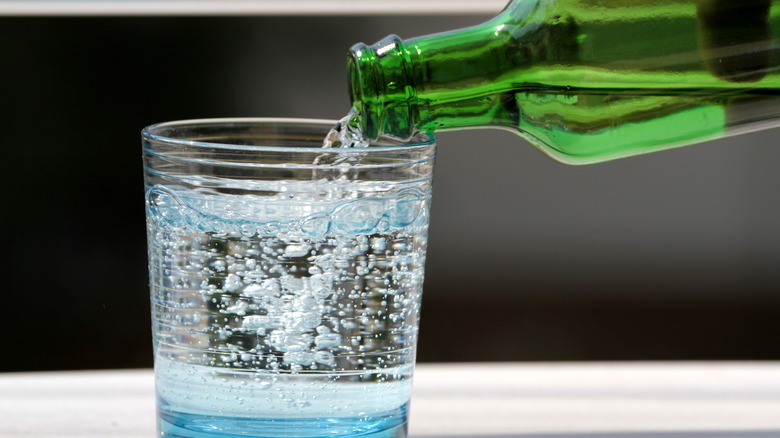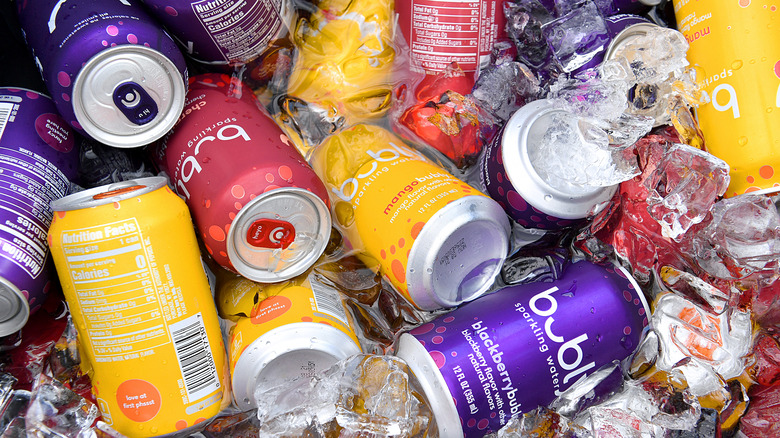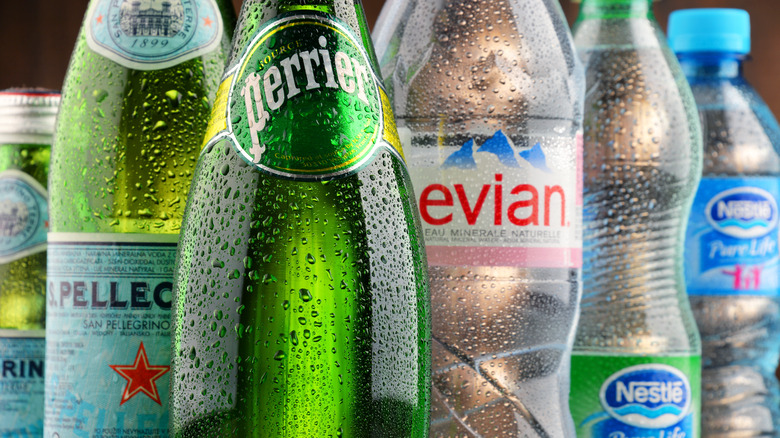Is There A Nutritional Difference Between Mineral Water And Sparkling?
You might think water, particularly bottled water, isn't a terribly interesting topic, but you'd likely be surprised to find that it's far more complex, profitable, and regulated than you'd guess. Supermarket News reported that 2021 saw a new record for the total volume of bottled water sold, a staggering 15.7 billion gallons in the U.S. alone. In 2021, each American consumed roughly 47 gallons of bottled water, and the annual sales of bottled water topped out at $40.2 billion. The rise in the popularity of bottled water has come at the expense of sugary drinks — which used to outsell water — a promising sign that Americans are opting for healthier beverage choices.
And water isn't just water. The FDA, for example, recognizes at least 13 different kinds of bottled water, in specifically delineated categories like artesian water, distilled water, mineral water, sparkling water, and deionized water. Each category has legal parameters specifying how the water is collected, treated, and labeled.
Some of our water choices are made based on flavor preferences, like preferring grapefruit-flavored Bubly to passionfruit Bubly. And while we know tonic water, for example, is sparkling water that also contains sugar and quinine (per McGill), meaning it's not a calorie-free option, knowing what's in your bottle of water nutritionally isn't necessarily as straightforward as you might expect. For example, what's the nutritional difference between mineral water and sparkling water?
Sparkling water's nutritional profile is free and clear
MasterClass explains that sparkling water is simply water that's been carbonated. According to the USDA's Food Data Central, the nutritional content of Bubly sparkling water, all flavors, shows straight zeroes — no calories, sugar, carbs, protein, calcium, or sodium. The same goes for La Croix, Deer Park, and Polar sparkling waters. They have no nutritional value, apart from their value as a source of hydration. Sparkling water doesn't provide nutrition, but on the positive side, there aren't additives, like sodium, that some people with restricted diets might need to watch out for.
Mineral water is a little more complicated
Mineral water, according to MasterClass, can be either sparkling or still, and the bubbles can either be naturally occurring or the water can be carbonated, like regular sparkling water. Mineral water, as you might deduce, contains minerals like magnesium, zinc, sodium, and calcium.
The nutritional data on mineral water will differ from brand to brand, as each source naturally contains different minerals in different concentrations. Perrier, according to the USDA, contains no calories, carbs, protein, sodium, or sugar, though it does contain 16 grams of calcium for every 100 milliliters you consume. Pellegrino, on the other hand, contains 17 milligrams of calcium and 4 milligrams of sodium. Topo Chico doesn't contain any calcium and has 4 milligrams of sodium. Evian, a still mineral water, contains 6 milligrams of calcium and 2 milligrams of magnesium, with no sodium.
Clearly, for mineral water, the nutritional content will naturally vary from brand to brand. If there's a mineral you're looking to either consume or avoid, the best practice is to read the label.


